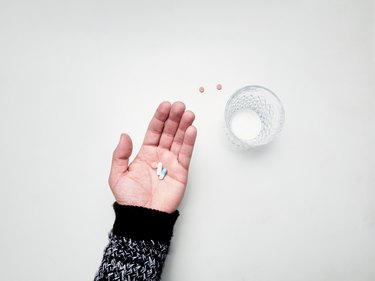
Diet pills like Lipozene claim to help you lose weight effectively. But this supplement can come with health consequences, which is why it's important to know about Lipozene's side effects before you give it a try.
Here, learn what this supplement is and the potential dangers of using Lipozene.
Video of the Day
Video of the Day
Tip
Talk to your doctor before taking Lipozene (or any weight-loss pill, for that matter) to make sure it's safe, especially if you have a medical condition or take prescription medication, per the National Institutes of Health's Office of Dietary Supplements (ODS).
What Is Lipozene and What Are the Ingredients?
So, what does Lipozene do? It's a weight-loss supplement that promises to help you feel full, eat less and, in doing so, lose weight, according to the manufacturer's website.
The main Lipozene ingredient is a konjac root extract called glucomannan, which is a natural fiber found in the roots of the elephant yam plant, per December 2013 research in the Journal of Obesity.
This fiber absorbs water and expands in your digestive system, which, in theory, makes you feel satiated and prompts you to eat less and shed pounds (so no, Lipozene doesn't burn fat). The Lipozene website recommends taking two pills before each big meal you eat, or about six pills a day.
But does Lipozene work? A March 2015 review in Nutrition study found that taking glucomannan supplements for two months helped adults with overweight or obesity lose some weight — about 7 pounds more than those who didn't take the supplement.
However, this study didn't investigate Lipozene specifically, so more research is needed to see if the diet pill is linked to the same effects.
And other research isn't so promising. For instance, a February 2014 review in the Journal of the American College of Nutrition found that people who used glucomannan lost only about 0.5 pounds more than those who took a placebo — in other words, the supplement isn't very effective for weight loss.
And there's no evidence to suggest that Lipozene alone can help you lose weight and keep it off in the long term. The Journal of Obesity study found that glucomannan didn't lead to significant feelings of fullness or weight loss in adults with overweight or obesity who didn't alter their diet and exercise habits.
It's also important to remember that the pill isn't regulated by the FDA, meaning there's no guarantee that Lipozene is safe, contains the ingredients it says it does or produces the effects it claims.
Lipozene vs. Other Weight-Loss Tactics
Eating a nutritious diet and exercising regularly — not diet pills like Lipozene — are your best bet when it comes to sustainable weight loss, according to the Mayo Clinic.
Side Effects of Taking Lipozene
The jury's still out on whether Lipozene does or doesn't help you lose weight. But there are some risks of taking Lipozene — here are those potential side effects.
1. It Can Cause Digestive Issues
Digestive problems are the most common Lipozene side effects, per the ODS.
Adding large amounts of fiber to your diet all at once can upset your digestive system, according to the Mayo Clinic. That — along with the fact that glucomannan expands in your gut — can lead to gastrointestinal side effects, per the ODS.
Indeed, Lipozene can make you poop. Here are some of the digestive issues you may experience from the supplement:
- Flatulence
- Loose stools
- Diarrhea
- Constipation
- Abdominal discomfort
Tip
It's best to get your fiber from whole foods rather than supplements unless your doctor recommends otherwise, per the Mayo Clinic.
2. It Can Obstruct Your Esophagus
Because glucomannan expands in water, there's a slight risk that it can create a blockage in your esophagus as it absorbs fluid (particularly if you take it in solid tablet form), per the ODS.
This potential Lipozene side effect can lead to pain or difficulty swallowing, the feeling of something stuck in your throat or trouble breathing, according to the Mayo Clinic.
Tip
Make sure to take supplements that contain glucomannan with plenty of water to avoid an esophageal obstruction, per the ODS.
3. It Doesn't Mix Well With Certain Medications
Glucomannan may reduce the absorption of certain medications, resulting in decreased effectiveness of the drugs, according to Oregon State University's Linus Pauling Institute.
So if you're taking any prescription medication, talk to your doctor before trying the supplement to make sure Lipozene is not dangerous for you.
Does Lipozene Affect Blood Pressure?
There's no evidence to show Lipozene's side effects include blood pressure issues. In fact, research suggests that supplementing your diet with soluble fibers like glucomannan may help lower diastolic blood pressure, per January 2018 research in Nutrition, Metabolism & Cardiovascular Diseases.
That said, this research looked at fiber supplements, not Lipozene specifically, so the same findings may not link to the weight-loss pill.
- Lipozene: "Lipozene Really Works"
- Office of Dietary Supplements: "Dietary Supplements for Weight Loss"
- Journal of Obesity: "Safety and Efficacy of Glucomannan for Weight Loss in Overweight and Moderately Obese Adults"
- Nutrition: "The effect of glucomannan on body weight in overweight or obese children and adults: a systematic review of randomized controlled trials"
- Journal of the American College of Nutrition: "The efficacy of glucomannan supplementation in overweight and obesity: a systematic review and meta-analysis of randomized clinical trials"
- U.S. Food and Drug Administration: “FDA 101: Dietary Supplements”
- Mayo Clinic: "Diet and exercise"
- Mayo Clinic: "Dietary fiber: Essential for a healthy diet"
- Mayo Clinic: "Dysphagia"
- Linus Pauling Institute: "Fiber"
- Nutrition, Metabolism & Cardiovascular Diseases: "The effect of viscous soluble fiber on blood pressure: A systematic review and meta-analysis of randomized controlled trials"